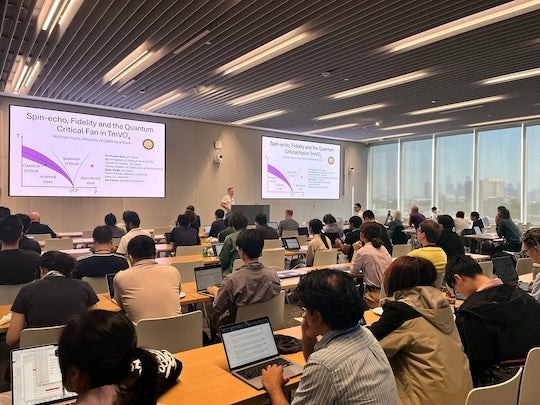
Organized by Rice University’s Extreme Quantum Materials Alliance (eQMA) in collaboration with the Smalley-Curl Institute, the eQMA Workshop on Quantum Materials and Entanglement brought together more than 100 experts and attendees from across the globe to discuss cutting-edge advancements in quantum research.
The three-day event Oct. 7-9 at the Ralph S. O’Connor Building for Engineering and Science focused on the intersection of quantum materials and quantum information, two rapidly growing research areas with the potential to revolutionize science and technology. Participants explored topics including quantum magnetism, quantum Hall systems, quantum emulators, strange metals, topological excitations and entanglement witness.
“The workshop aimed to foster new research ideas and strengthen collaboration among experts in the field,” said Qimiao Si, director of eQMA, the Harry C. and Olga K. Wiess Professor of Physics and Astronomy and an event organizer.

A key theme of the event was quantum entanglement, a phenomenon where particles become interconnected regardless of distance, and how the entanglement within quantum materials could open new doors for scientific research and technological applications. Experts also examined how tools from quantum information science can further our understanding of quantum materials.
“This event is a part of our efforts to push boundaries in quantum materials research,” Si said. “It is among the very first meetings worldwide with a focus on the emerging interface between quantum materials and quantum information science.”
Rice students played an active role in the discussions. Bin Gao, a postdoctoral associate in physics and astronomy, presented on the emergent photons and fractionalized excitations in a quantum spin liquid, while Lei Chen, a Ph.D. student in physics and astronomy, discussed amplified entanglement witnessed in quantum critical metals. Dasom Kim, a graduate student in the applied physics program, addressed the magnonic superradiant phase transition concept for achieving perfect ground-state squeezing.
The event also featured prominent speakers from around the world, including Silke Paschen from the Vienna University of Technology, who spoke on entanglement witnessed in a strange metal; Matteo Mitrano from Harvard University, who presented findings on witnessing many-body entanglement in quantum materials in and out of equilibrium; Karyn Le Hur from the French institute Ecole Polytechnique, who shared information on the entangled nature and topological aspects of the Bell state and many-body systems; and Pedram Roushan from Google, who talked about novel quantum dynamics with superconducting qubits.
Rice’s Pengcheng Dai, the Sam and Helen Worden Professor of Physics and Astronomy; Kaden Hazzard, associate professor of physics and astronomy; Yonglong Xie, assistant professor of physics; and Ming Yi, associate professor of physics and astronomy, along with Gabriel Aeppli from ETH Zürich, were co-organizers of the event.
The workshop was co-sponsored by the Gordon and Betty Moore Foundation’s EPiQS program, Rice Advanced Materials Institute, Vannevar Bush Faculty Fellowship’s project on extreme quantum materials, American Physical Society/Physical Review X and Oxford Instruments.

